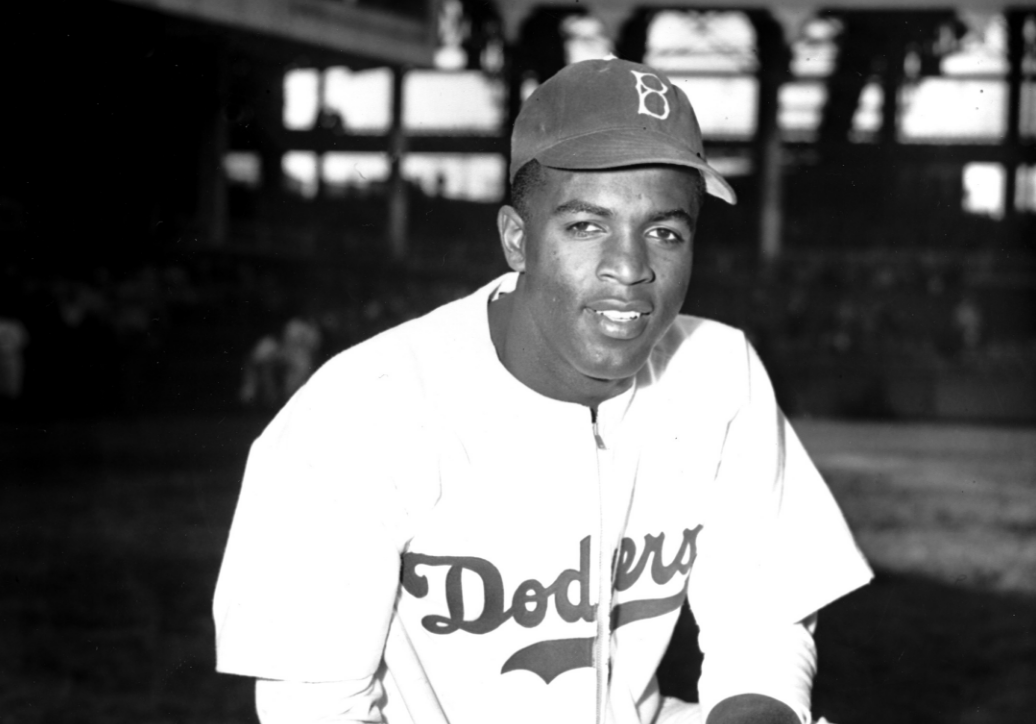Jackie Robinson was an accomplished multi-sport athlete who in 1947 became the first black baseball player in the modern major leagues. He displayed courage in the face of racial abuse, earning the respect of teammates, opponents and fans during his Hall of Fame career. His on-field play and off-field involvement in political and social causes helped galvanize the American civil rights movement.
Jackie Robinson’s Early Days
Jack Roosevelt Robinson was born Jan. 31, 1919, in Cairo, Georgia. When Jackie was still a baby, his father deserted his mother, who took her five children to Pasadena, California, where Jackie would grow up in an almost entirely white neighborhood. Robinson showed his athletic gifts early, and went on to become the first student to letter in four sports at UCLA (football, basketball, baseball and track).
In 1942, he was drafted into the Army and assigned to Fort Riley, where he attempted to enroll in Officers’ Candidate School. After learning that blacks were not allowed to join because they “lacked leadership ability,” Robinson—with the help of fellow Fort Riley recruit, heavyweight boxing champion Joe Louis—protested the situation and persuaded the OCS to admit black soldiers.
Robinson was known to be confrontational when facing racial discrimination, illustrated in a 1944 incident where Robinson refused to move to the back of a military bus. Robinson, who had the legal right to sit in the front, refused to back down to the bus driver or to superior officers who investigated the incident. He was charged with insubordination and court-martialed, but he was found not guilty by an all-white jury.
Robinson’s Baseball Career
Robinson received an honorable discharge from the Army and joined the Kansas City Monarchs of the Negro League in 1945. During this time, Branch Rickey, general manager of the Brooklyn Dodgers, had the idea to integrate the major leagues, which operated under an unspoken agreement not to sign black ballplayers.
Rickey scouted talented black players for his “great experiment,” and decided that Robinson had the athletic talent and personal courage to break baseball’s color barrier. “I wanted a man of exceptional intelligence, a man who was able to grasp and control the responsibilities of himself to his race and could carry that load,” he said in a 1956 speech.
Robinson debuted with the Dodgers in 1947. As expected, he faced verbal and physical abuse from fans and players, but repeatedly turned the other cheek and concentrated on his play, earning the admiration of teammates and Dodgers fans.
“Jackie Robinson had to be bigger than life,” writes Hall of Famer Hank Aaron in Time. “He had to be bigger than the Brooklyn teammates who got up a petition to keep him off the ball club, bigger than the pitchers who threw at him or the base runners who dug their spikes into his shin, bigger than the bench jockeys who hollered for him to carry their bags and shine their shoes, bigger than the so-called fans who mocked him with mops on their heads and wrote him death threats.”
As his career progressed and respect for him grew, he began to speak out against racial discrimination. “He stirred controversy by protesting—umpires’ calls, hotels that refused to let him stay with his teammates, and teams that refused to hire black players,” writes the Library of Congress.
Robinson, along with Larry Doby, who joined the Cleveland Indians later in the 1947 season, opened the doors for black players in the major leagues. Aaron, who joined the majors in 1954, writes, “Before Jackie Robinson broke the color line, I wasn’t permitted even to think about being a professional baseball player … All that changed when Jackie put on No. 42 and started stealing bases in a Brooklyn uniform.”
In his 10-year career, Robinson was named an all-star six times and won a National League Rookie of the Year and MVP award. He was inducted into the Baseball Hall of Fame in 1962, his first year of eligibility.
The Rest of the Story
After his retirement, Robinson became involved in business, politics and social causes. His health was poor, however. He suffered a heart attack in 1968 and became nearly blind from diabetes. On October 24, 1972, he had a second heart attack in his Stamford, Connecticut, home and died at the age of 53.
In 1997, Major League Baseball celebrated the 50th anniversary of his Dodgers debut by retiring his number 42 for all teams. Today, MLB celebrates Jackie Robinson Day every April 15 in honor of his first major league game.











